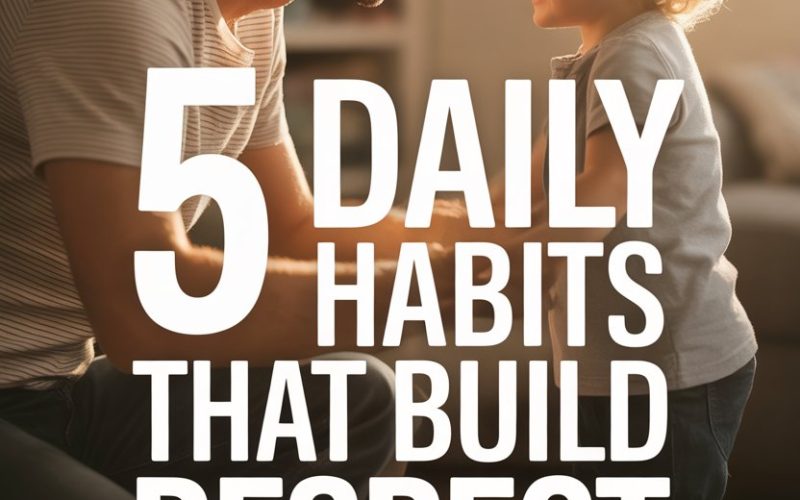Raising kids who understand and show respect isn’t just about nagging them to say “please” and “thank you.”
It’s less a matter of etiquette bootcamp, more a lifelong game of Monkey See, Monkey Do—except sometimes the monkeys are sticky, loud, and absolutely sure they’re right (even when they’re six).
Still, busy parents can nurture respect in their children with some surprisingly simple, day-to-day habits.
These aren’t grand, Pinterest-worthy projects. These are small, repeatable actions—because, let’s face it, you’re lucky if you get to drink your tea before it goes cold.
Here are five daily habits that quietly, persistently teach respect—even when you’re running on toast crumbs and coffee.
1. Model Respect—Even When You’re Annoyed
Children learn far more from what we do than what we say.
If you treat the postie, checkout clerk, and your own partner with respect (even when they leave the milk out—again), your kids are watching. They’re filing it away.
Does this mean you have to be a saint? Not even close. In fact, letting your kids witness you getting grumpy or frustrated—and then handling it with grace—teaches them loads.
When you lose your cool and apologise sincerely, they see that respect isn’t about being perfect, but about treating others’ feelings as real and important.
Researchers have found that parents modeling respectful conflict resolution helps children develop empathy and social skills. This isn’t just about adults, either.
If your child’s toy is in your way and you ask (rather than bark) for it to be picked up, you’re laying the groundwork for mutual respect.
And if you slip and bark anyway, you can still model respect by saying, “Sorry, I was snappy. Can you help me with this, please?”
It’s that simple. Kids see, kids do. Don’t worry, they’ll call you out the first time you forget.
2. Speak to Kids the Way You Want Them to Speak to You
Ever caught yourself talking to your child in a tone you’d never use with another adult? You’re not alone.
It’s easy to get stuck in “parent voice” mode. But if the goal is respect, tone matters as much as words.
Try this: Speak to your child as if they’re your favourite colleague, not your slowest intern.
Use polite words. Listen when they answer. Make eye contact. Even if your brain is already halfway through tomorrow’s to-do list.
Experts at Harvard’s Center on the Developing Child recommend “serve and return” interactions—responding thoughtfully to what your child says.
This builds trust and self-worth, two ingredients essential for respectful relationships.
And yes, you can still set boundaries. “It’s not time for screens right now” delivered firmly but kindly is worlds away from a shouty “How many times do I have to tell you?”
Your child is more likely to comply—and do so without muttering choice words under their breath.
3. Make Respect a Two-Way Street
Nothing teaches respect quite like being respected yourself. It sounds obvious, but many families get stuck in the “because I said so” rut. Kids are told to listen, but rarely feel heard.
Here’s where it gets interesting: When children feel their thoughts and emotions matter, they’re far more likely to extend that courtesy to others.
This doesn’t require you to say yes to every demand for ice cream at breakfast. (You have your limits, and dentists everywhere thank you.) Instead, acknowledge their feelings, even if you can’t fulfil their wishes.
“Sounds like you’re really disappointed we can’t go to the park today. I get it—it’s rubbish when plans change, isn’t it?”
According to child psychologist Dr. Laura Markham, validating your child’s feelings helps them internalise the golden rule: treat others how you want to be treated.
Over time, they’ll learn respect isn’t about power, but about understanding and kindness.
Who knew that listening to a five-minute rant on the unfairness of bedtime could actually be character-building?
4. Encourage Independent Problem-Solving
Every parent dreams of the day their child sorts out sibling squabbles without yelling for a referee.
Kids who can negotiate, compromise, and empathise are better equipped for respectful relationships—at home and out in the big, wild world.
Start small. When conflict erupts over whose turn it is with the remote, resist the urge to swoop in and solve it all.
Instead, coach your kids through the process: “Hmm, it sounds like you both want the same thing. What do you think would be fair?”
Research from the Child Mind Institute shows that children who practise problem-solving and compromise develop stronger social skills and a deeper appreciation for others’ needs.
And yes, it takes patience. You may need to step in occasionally—before the glitter glue becomes a weapon.
But each time you guide them to a solution (rather than dictating one), you’re teaching respect: for themselves, for each other, and for the process of working things out.
Bonus: One day, you might actually drink that entire cup of tea before it gets cold.
5. Praise Respectful Behavior Whenever You Spot It
Nothing motivates kids quite like being “caught” doing something right.
When you spot moments of kindness, patience, or politeness, name it and celebrate it. “I saw how you waited for your turn on the swing—very thoughtful!” Or, “You listened really carefully to Gran on the phone; I bet she felt special.”
Praise works best when it’s specific and tied to the behaviour you want to see more of.
According to a study published in Children Development, positive reinforcement increases the likelihood of respectful actions recurring.
This isn’t about gold stars or sticker charts (though if that’s your jam, go wild). It’s about helping your child realise that respect feels good—both for themselves and the people around them.
And if your child is having a day where “respect” means not hurling the remote through a window, well, sometimes you have to celebrate the small wins.
Respect Is the Gift That Keeps on Giving
Parenting respectful kids isn’t about perfection—on their part or yours. It’s about showing up, every day, with tiny actions that say, “I value you, and I value others.”
Kids who see and feel respect at home will take it out into the world, one “please,” “thank you,” and “would you mind moving your shoes out of the hall?” at a time.
It’s not always glamorous, and it’s rarely quiet. But by weaving these habits into daily life, you’re raising kids who know that respect isn’t just a word adults throw around—it’s something you live.
Even if you have to remind them to live it for the millionth time while stepping over yet another Lego.
You’ve got this. And that’s worthy of a little respect, too.




